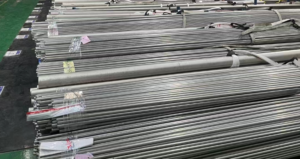In the realm of metallurgy, Inconel 825 and Incoloy 825 occupy a distinct and respected position. Both alloys are renowned for their exceptional corrosion resistance in diverse environments, but there are subtle yet significant differences between Inconel 825 and Incoloy 825 that are worth exploring. In this article, we aim to provide a comprehensive and authoritative comparison of Inconel 825 and Incoloy 825.

What are the differences between Inconel 825 and Incoloy 825?
The Differences between Inconel 825 and Incoloy 825 – 1. Composition
Firstly, let’s delve into the compositional aspects of these alloys. Both Inconel 825 and Incoloy 825 are nickel-chromium-iron alloys with the addition of molybdenum, copper, and titanium. The primary difference lies in the precise ratios of these elements, which affect their performance characteristics. Inconel 825 typically has a slightly higher nickel content, conferring superior resistance to chloride-induced stress corrosion cracking. On the other hand, Incoloy 825 may have a more balanced composition, optimizing its performance in a wider range of corrosive environments.
The Differences between Inconel 825 and Incoloy 825 – 2. Corrosion Resistance
Moving on to their corrosion resistance, both alloys exhibit remarkable resilience against attack from various acids, including sulfuric, nitric, phosphoric, and hydrochloric acids. However, Incoloy 825 tends to excel in sulfate-rich environments due to its optimized alloy composition. Its resistance to general corrosion, pitting, crevice corrosion, intergranular corrosion, and stress corrosion cracking is particularly noteworthy. Inconel 825, while equally robust, may demonstrate slightly different behavior depending on the specific corrosive agent and environmental conditions.
The Differences between Inconel 825 and Incoloy 825 – 3. Welding and Fabrication
When it comes to welding and fabrication, both alloys offer good weldability and formability. However, Incoloy 825 has a lower carbon content, which minimizes the risk of sensitization during welding and reduces the sensitivity to intergranular corrosion. This aspect can be crucial in critical applications where welding is a necessary part of the manufacturing process.
The Differences between Inconel 825 and Incoloy 825 – 4. Temperature Resistance
Temperature resistance is another area where these alloys differ. While both Inconel 825 and Incoloy 825 can withstand high temperatures, Inconel 825 tends to retain its mechanical properties at elevated temperatures better. This characteristic makes it a preferred choice in high-temperature applications such as heat exchangers and other components exposed to extreme thermal conditions.
The Differences between Inconel 825 and Incoloy 825 – 5. Mechanical Properties
Mechanical properties are also worth discussing. Both alloys possess excellent tensile strength and yield strength, but their hardness and ductility may vary slightly. The specific application requirements will determine which alloy is more suitable based on these mechanical properties.
The Differences between Inconel 825 and Incoloy 825 – 6. Cost
Cost is another factor that can influence the choice between Inconel 825 and Incoloy 825. While both alloys are relatively expensive due to their specialized composition and manufacturing processes, market conditions and availability can affect their pricing. In some instances, one alloy may be more cost-effective than the other, depending on the quantity required and the supplier’s pricing policies.
The Differences between Inconel 825 and Incoloy 825 – 7. Applications
Lastly, it’s worth mentioning that Inconel 825 and Incoloy 825 are often used interchangeably in many applications. This is because their performance characteristics overlap in many respects, and they can often fulfill the same functional requirements. However, a thorough understanding of their specific differences is crucial for selecting the most appropriate alloy for a given application.
Conclusion
In summary, Inconel 825 and Incoloy 825 are highly specialized nickel-based alloys with excellent corrosion resistance and high-temperature performance. While they share many similarities, subtle differences in composition, corrosion resistance, welding characteristics, temperature resistance, mechanical properties, and cost make them suitable for different applications.
Thank you for reading our article and we hope you’ve enjoyed it. If you are looking for Inconel 825 and Incoloy 825 suppliers and manufacturers online now, we advise you to visit Huaxiao Alloy.
As a leading supplier of Inconel and Incoloy Alloys from Shanghai China, Huaxiao Alloy offers customers high-quality Inconel 825 and Incoloy 825 at a very competitive price.



